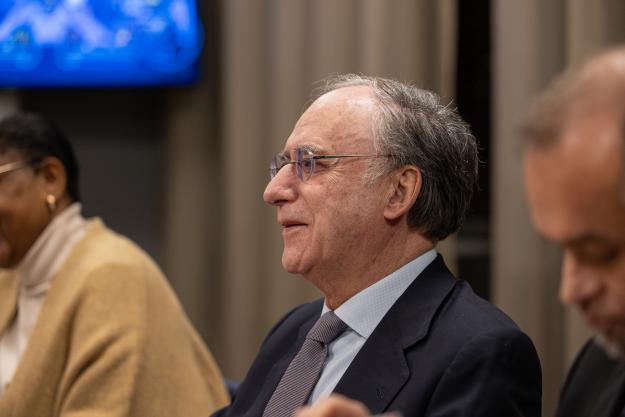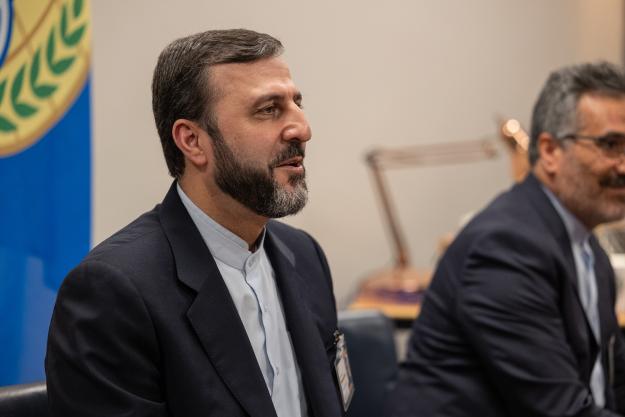The Director-General of the Organisation for the Prohibition of Chemical Weapons (OPCW), Ambassador Fernando Arias, met with the Deputy Foreign Minister for Legal and International Affairs of the Islamic Republic of Iran, H.E. Dr. Kazem Gharibabadi, on 26 November 2024, on the sidelines of the Twenty-Ninth Session of the Conference of the States Parties to the Chemical Weapons Convention (CSP-29) in The Hague, Netherlands.
During the meeting, the Deputy Foreign Minister and the Director-General discussed a range of issues related to the implementation of the Chemical Weapons Convention (CWC). Both sides underscored the importance of upholding the global norm against chemical weapons and the role of multilateralism in addressing contemporary challenges in chemical disarmament and non-proliferation.
Director-General Arias briefed the Deputy Foreign Minister on the Organisation's efforts to achieve the goals of the CWC. He underlined that: "With complete destruction of all declared chemical weapons stockpiles, the OPCW's focus has shifted to preventing the re-emergence of chemical weapons. The Organisation continues to adapt to evolving international security environment, taking into account the developments of science and technology and trends in the chemical industry."

Ambassador Fernando Arias, OPCW Director-General during a meeting with H.E. Dr. Kazem Gharibabadi the Deputy Minister of Foreign Affairs for Legal and International Affairs of the Islamic Republic of Iran.
The Director-General further stated: "Capacity building for Member States is essential for the implementation of the CWC. The OPCW Centre for Chemistry and Technology (ChemTech Centre) is fully operational. Activities at the Centre have bolstered national and regional capabilities in chemical safety and security to respond to the use of chemical weapons and incidents involving toxic chemicals."
Director-General Arias also touched on the universality efforts of the Organisation, saying: "The Technical Secretariat has been constantly promoting universal adherence to the Convention and reaching out to the remaining four States not Party to the Convention. We are hopeful that South Sudan will soon join as our 194th State Party."
The Deputy Foreign Minister said: "The Islamic Republic of Iran, as the biggest victim of chemical weapons in the contemporary era, fully supports the goals of the Convention and the Organisation and the professional, independent and impartial activities of the Technical Secretariat."

H.E. Dr. Kazem Gharibabadi, Deputy Minister of Foreign Affairs for Legal and International Affairs of the Islamic Republic of Iran during a meeting with Ambassador Fernando Arias, OPCW Director-General.
"Victims of chemical weapons have been the main momentum for the conclusion of the Convention and establishment of the Organisation. Addressing their needs shall accordingly be among the priorities of the Organisation," said Deputy Foreign Minister Gharibabadi.
He further stated that: "After the destruction of declared stockpiles, universality of the Convention shall be a priority for the Organisation. There is no justification for having and using chemical weapons by anyone, anywhere, under any circumstances."
Background
The Islamic Republic of Iran has been an active member of the OPCW since the Chemical Weapons Convention entered into force in 1997. Iran is a member of the Executive Council, the OPCW's executive organ, which is charged with promoting the effective implementation of and compliance with the Chemical Weapons Convention as well as supervising the activities of the Organisation's Technical Secretariat.
As the implementing body for the Chemical Weapons Convention, the OPCW, with its 193 Member States, oversees the global endeavour to permanently eliminate chemical weapons. Since the Convention's entry into force in 1997, it is the most successful disarmament treaty eliminating an entire class of weapons of mass destruction.
On 7 July 2023, the OPCW verified that all chemical weapons stockpiles declared by the 193 States Parties to the Chemical Weapons Convention since 1997 - totalling 72,304 metric tonnes of chemical agents - have been irreversibly destroyed under the OPCW's strict verification regime.
For its extensive efforts in eliminating chemical weapons, the OPCW received the 2013 Nobel Peace Prize.






